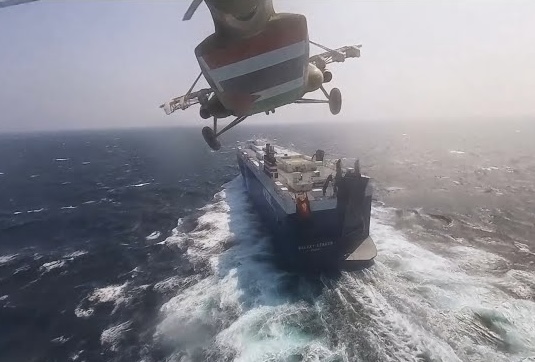Commercial shipping in the Red Sea drops by 90 per cent because of Houthi attacks
A report by the US defence department covers the period between December and February, involving about 65 countries and 29 shipping and energy companies. This has increased insurance premiums and pollution. Attacks by the pro-Iranian militant group were sparked by the war in Gaza.
Sana'a (AsiaNews) – Commercial shipping in the Red Sea dropped by 90 per cent between December and February as a result of attacks by pro-Iranian Houthis who control part of Yemen, including the capital Sana'a, this according to a report released by the Defense Intelligence Agency (DIA) of the US Department of Defense.
The attacks have affected at least 65 countries forcing up to 29 major shipping and energy companies, including giants like British Petroleum, Evergreen, CMA CGM, Maersk, Qatar Energy and Shell, to change their routes.
As container ships take the alternative route around the Cape of Good Hope in South Africa to avoid rockets and drones, they have to travel an extra 11,000 nautical miles and add at least 10 days, increasing fuel costs by up to a US$ 1 million per trip.
According to the report, which is the first comprehensive assessment of the economic impact of the pro-Gaza military campaign by the Iranian-backed rebel group in Yemen, insurance premiums for ships taking the Red Sea route have jumped considerably.
In mid-February, premiums rose to 0.7-1.0 per cent of a ship’s total value, compared to less than 0.1 per cent in the pre-December 2023 period.
“Threats to Red Sea transits are compounding ongoing stress to global maritime shipping caused by interruptions at the Panama Canal due to drought,” the DIA said.
The United States and the United Kingdom have launched repeated airstrikes against Houthi positions, in Sana'a, in an effort to reduce their ability to target ships in the region, while seeking to block their sources of income and impose other financial sanctions.
Nevertheless, the militant group have not given up and the economic fallout has continued to increase for shipping and other companies around the world.
The Houthis began their campaign in 2023 to pressure Israel and its allies in connection with the war in Gaza. This has continued uninterruptedly. On 12 June, the engine room of a cargo ship, the Tutor, suffered severe flooding following the first successful attack by a seaborne drone. A small cargo ship was hit by two bullets the next day, causing a fire.
The attacks have also impacted humanitarian relief efforts in both Sudan and Yemen, with aid delivery delayed by weeks due to longer routes around Africa.
This crisis has far-reaching implications, not only for the shipping industry, but also for the environment and the global economy.
The longer routes have increased travel distances for cargo ships and tankers by up to 53 per cent, spiking CO2 emissions from additional fuel burnt.
This has led to a surge in freight rates and shipping insurance costs, contributing to inflation and negatively impacting regional and international shipping economies.
Analysts note that the Red Sea crisis highlights the interconnectedness of global trade and the importance of maintaining safe and open shipping routes.
As the situation evolves, the international community must work together to navigate troubled waters to mitigate the economic and environmental fallout.
26/07/2024 15:38
11/08/2017 20:05







.png)










